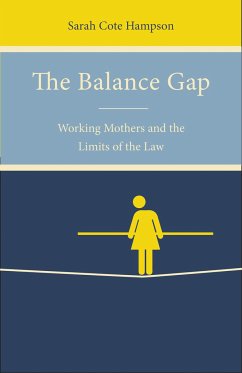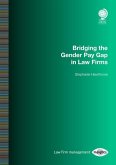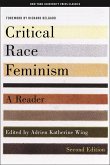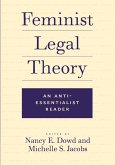- Broschiertes Buch
- Merkliste
- Auf die Merkliste
- Bewerten Bewerten
- Teilen
- Produkt teilen
- Produkterinnerung
- Produkterinnerung
Sarah Cote Hampson is Assistant Professor of Public Law at the University of Washington Tacoma.
Andere Kunden interessierten sich auch für
![Bridging the Gender Pay Gap in Law Firms Bridging the Gender Pay Gap in Law Firms]() Stephanie HawthorneBridging the Gender Pay Gap in Law Firms81,99 €
Stephanie HawthorneBridging the Gender Pay Gap in Law Firms81,99 €![The Case of Mumia Abu-Jamal: A Life in the Balance The Case of Mumia Abu-Jamal: A Life in the Balance]() Amnesty InternationalThe Case of Mumia Abu-Jamal: A Life in the Balance8,49 €
Amnesty InternationalThe Case of Mumia Abu-Jamal: A Life in the Balance8,49 €![Aging and the Law Aging and the Law]() Lawrence FrolikAging and the Law51,99 €
Lawrence FrolikAging and the Law51,99 €![Critical Race Feminism, Second Edition Critical Race Feminism, Second Edition]() Critical Race Feminism, Second Edition39,99 €
Critical Race Feminism, Second Edition39,99 €![Kenneth Njiri Commentaries in the Legal Perspective: The Principle of Self-determination: A Delicate Balance Between Unilateral Secession and Territor Kenneth Njiri Commentaries in the Legal Perspective: The Principle of Self-determination: A Delicate Balance Between Unilateral Secession and Territor]() Kenneth NjiriKenneth Njiri Commentaries in the Legal Perspective: The Principle of Self-determination: A Delicate Balance Between Unilateral Secession and Territor42,99 €
Kenneth NjiriKenneth Njiri Commentaries in the Legal Perspective: The Principle of Self-determination: A Delicate Balance Between Unilateral Secession and Territor42,99 €![Feminist Legal Theory Feminist Legal Theory]() Nancy E DowdFeminist Legal Theory33,99 €
Nancy E DowdFeminist Legal Theory33,99 €![Evidence and the Archive Evidence and the Archive]() Evidence and the Archive67,99 €
Evidence and the Archive67,99 €-
-
-
Sarah Cote Hampson is Assistant Professor of Public Law at the University of Washington Tacoma.
Hinweis: Dieser Artikel kann nur an eine deutsche Lieferadresse ausgeliefert werden.
Hinweis: Dieser Artikel kann nur an eine deutsche Lieferadresse ausgeliefert werden.
Produktdetails
- Produktdetails
- Verlag: Stanford University Press
- Seitenzahl: 184
- Erscheinungstermin: 21. März 2017
- Englisch
- Abmessung: 213mm x 137mm x 18mm
- Gewicht: 249g
- ISBN-13: 9781503602151
- ISBN-10: 150360215X
- Artikelnr.: 46008933
- Herstellerkennzeichnung
- Libri GmbH
- Europaallee 1
- 36244 Bad Hersfeld
- gpsr@libri.de
- Verlag: Stanford University Press
- Seitenzahl: 184
- Erscheinungstermin: 21. März 2017
- Englisch
- Abmessung: 213mm x 137mm x 18mm
- Gewicht: 249g
- ISBN-13: 9781503602151
- ISBN-10: 150360215X
- Artikelnr.: 46008933
- Herstellerkennzeichnung
- Libri GmbH
- Europaallee 1
- 36244 Bad Hersfeld
- gpsr@libri.de
Sarah Cote Hampson is Assistant Professor of Public Law at the University of Washington Tacoma.
Contents and Abstracts
Introduction: In Pursuit of "Balance"
chapter abstract
This chapter provides the theoretical outline of the book, and explains why
we should care about how women form their legal consciousness around
work/life balance policies in public universities and the U.S. military.
1Navigating the Rules in Public Universities
chapter abstract
This chapter focuses on the experiences of women faculty in public
universities. It explores both the formal and informal rules and norms that
women navigated when making decisions about claiming their rights to
work/life balance laws and policies within their institutions.
2Navigating the Rules in the U.S. Military
chapter abstract
This chapter focuses on the experiences of women who are currently serving,
or who have served, in the U.S. military. It explores both the formal and
informal rules and norms that women navigated when making decisions about
claiming their rights to work/life balance laws and policies within their
institutions.
3Looking Out and Speaking Up: Individual Agency and Networks
chapter abstract
This chapter compares the case studies presented in Chapters 1 and 2 and
focuses on the instrumental design element of the theoretical framework for
the book. It explores how individuals act with agency to form their own
legal consciousness around work/life balance policies, and the legal
consciousness of those around them, using institutional consciousness
networks (ICNs). These networks can function as a way for women to gain
legal knowledge, seek emotional and professional support, and exercise
resistance to institutional culture.
4Status Speaks: The Importance of Rank
chapter abstract
This chapter examines more closely and compares the institutional
structures of public universities and the U.S. military. It does so
specifically by focusing on these institutions through the lens of rank, an
institutional structure that controls the institutional cultures of both
institutions fairly significantly. This chapter focuses on how rank plays a
role in shaping women's legal consciousness formation in both institutions.
5In the Shadow of the Ideal Worker
chapter abstract
This chapter focuses on the ideological construct of the Ideal Worker. This
construct affects the legal consciousness of women in both public
universities and the U.S. military by stereotyping mothers in these
professions are "nonideal." For women faculty, this stereotype casts them
as "not serious" about their careers, while women service members are
stereotyped as shirking their duties. The chapter concludes by discussing
the ways in which current work/life balance policies may in fact reinforce
these stereotypes rather than combating them.
Conclusion: Can Mothers Ever Be Ideal Workers?
chapter abstract
This chapter summarizes the findings of the book, concluding that legal
consciousness formation can be observed through instrumental,
institutional, and ideological processes. Having revealed in previous
chapters the limitations of current public policy aimed at achieving
work/life balance, this chapter offers some suggestions for improving the
efficacy of these policies. It concludes, however, that significant
cultural and institutional discursive shifts must take place in order for
public policy to have any meaningful impact on women's lived experiences as
working mothers.
Introduction: In Pursuit of "Balance"
chapter abstract
This chapter provides the theoretical outline of the book, and explains why
we should care about how women form their legal consciousness around
work/life balance policies in public universities and the U.S. military.
1Navigating the Rules in Public Universities
chapter abstract
This chapter focuses on the experiences of women faculty in public
universities. It explores both the formal and informal rules and norms that
women navigated when making decisions about claiming their rights to
work/life balance laws and policies within their institutions.
2Navigating the Rules in the U.S. Military
chapter abstract
This chapter focuses on the experiences of women who are currently serving,
or who have served, in the U.S. military. It explores both the formal and
informal rules and norms that women navigated when making decisions about
claiming their rights to work/life balance laws and policies within their
institutions.
3Looking Out and Speaking Up: Individual Agency and Networks
chapter abstract
This chapter compares the case studies presented in Chapters 1 and 2 and
focuses on the instrumental design element of the theoretical framework for
the book. It explores how individuals act with agency to form their own
legal consciousness around work/life balance policies, and the legal
consciousness of those around them, using institutional consciousness
networks (ICNs). These networks can function as a way for women to gain
legal knowledge, seek emotional and professional support, and exercise
resistance to institutional culture.
4Status Speaks: The Importance of Rank
chapter abstract
This chapter examines more closely and compares the institutional
structures of public universities and the U.S. military. It does so
specifically by focusing on these institutions through the lens of rank, an
institutional structure that controls the institutional cultures of both
institutions fairly significantly. This chapter focuses on how rank plays a
role in shaping women's legal consciousness formation in both institutions.
5In the Shadow of the Ideal Worker
chapter abstract
This chapter focuses on the ideological construct of the Ideal Worker. This
construct affects the legal consciousness of women in both public
universities and the U.S. military by stereotyping mothers in these
professions are "nonideal." For women faculty, this stereotype casts them
as "not serious" about their careers, while women service members are
stereotyped as shirking their duties. The chapter concludes by discussing
the ways in which current work/life balance policies may in fact reinforce
these stereotypes rather than combating them.
Conclusion: Can Mothers Ever Be Ideal Workers?
chapter abstract
This chapter summarizes the findings of the book, concluding that legal
consciousness formation can be observed through instrumental,
institutional, and ideological processes. Having revealed in previous
chapters the limitations of current public policy aimed at achieving
work/life balance, this chapter offers some suggestions for improving the
efficacy of these policies. It concludes, however, that significant
cultural and institutional discursive shifts must take place in order for
public policy to have any meaningful impact on women's lived experiences as
working mothers.
Contents and Abstracts
Introduction: In Pursuit of "Balance"
chapter abstract
This chapter provides the theoretical outline of the book, and explains why
we should care about how women form their legal consciousness around
work/life balance policies in public universities and the U.S. military.
1Navigating the Rules in Public Universities
chapter abstract
This chapter focuses on the experiences of women faculty in public
universities. It explores both the formal and informal rules and norms that
women navigated when making decisions about claiming their rights to
work/life balance laws and policies within their institutions.
2Navigating the Rules in the U.S. Military
chapter abstract
This chapter focuses on the experiences of women who are currently serving,
or who have served, in the U.S. military. It explores both the formal and
informal rules and norms that women navigated when making decisions about
claiming their rights to work/life balance laws and policies within their
institutions.
3Looking Out and Speaking Up: Individual Agency and Networks
chapter abstract
This chapter compares the case studies presented in Chapters 1 and 2 and
focuses on the instrumental design element of the theoretical framework for
the book. It explores how individuals act with agency to form their own
legal consciousness around work/life balance policies, and the legal
consciousness of those around them, using institutional consciousness
networks (ICNs). These networks can function as a way for women to gain
legal knowledge, seek emotional and professional support, and exercise
resistance to institutional culture.
4Status Speaks: The Importance of Rank
chapter abstract
This chapter examines more closely and compares the institutional
structures of public universities and the U.S. military. It does so
specifically by focusing on these institutions through the lens of rank, an
institutional structure that controls the institutional cultures of both
institutions fairly significantly. This chapter focuses on how rank plays a
role in shaping women's legal consciousness formation in both institutions.
5In the Shadow of the Ideal Worker
chapter abstract
This chapter focuses on the ideological construct of the Ideal Worker. This
construct affects the legal consciousness of women in both public
universities and the U.S. military by stereotyping mothers in these
professions are "nonideal." For women faculty, this stereotype casts them
as "not serious" about their careers, while women service members are
stereotyped as shirking their duties. The chapter concludes by discussing
the ways in which current work/life balance policies may in fact reinforce
these stereotypes rather than combating them.
Conclusion: Can Mothers Ever Be Ideal Workers?
chapter abstract
This chapter summarizes the findings of the book, concluding that legal
consciousness formation can be observed through instrumental,
institutional, and ideological processes. Having revealed in previous
chapters the limitations of current public policy aimed at achieving
work/life balance, this chapter offers some suggestions for improving the
efficacy of these policies. It concludes, however, that significant
cultural and institutional discursive shifts must take place in order for
public policy to have any meaningful impact on women's lived experiences as
working mothers.
Introduction: In Pursuit of "Balance"
chapter abstract
This chapter provides the theoretical outline of the book, and explains why
we should care about how women form their legal consciousness around
work/life balance policies in public universities and the U.S. military.
1Navigating the Rules in Public Universities
chapter abstract
This chapter focuses on the experiences of women faculty in public
universities. It explores both the formal and informal rules and norms that
women navigated when making decisions about claiming their rights to
work/life balance laws and policies within their institutions.
2Navigating the Rules in the U.S. Military
chapter abstract
This chapter focuses on the experiences of women who are currently serving,
or who have served, in the U.S. military. It explores both the formal and
informal rules and norms that women navigated when making decisions about
claiming their rights to work/life balance laws and policies within their
institutions.
3Looking Out and Speaking Up: Individual Agency and Networks
chapter abstract
This chapter compares the case studies presented in Chapters 1 and 2 and
focuses on the instrumental design element of the theoretical framework for
the book. It explores how individuals act with agency to form their own
legal consciousness around work/life balance policies, and the legal
consciousness of those around them, using institutional consciousness
networks (ICNs). These networks can function as a way for women to gain
legal knowledge, seek emotional and professional support, and exercise
resistance to institutional culture.
4Status Speaks: The Importance of Rank
chapter abstract
This chapter examines more closely and compares the institutional
structures of public universities and the U.S. military. It does so
specifically by focusing on these institutions through the lens of rank, an
institutional structure that controls the institutional cultures of both
institutions fairly significantly. This chapter focuses on how rank plays a
role in shaping women's legal consciousness formation in both institutions.
5In the Shadow of the Ideal Worker
chapter abstract
This chapter focuses on the ideological construct of the Ideal Worker. This
construct affects the legal consciousness of women in both public
universities and the U.S. military by stereotyping mothers in these
professions are "nonideal." For women faculty, this stereotype casts them
as "not serious" about their careers, while women service members are
stereotyped as shirking their duties. The chapter concludes by discussing
the ways in which current work/life balance policies may in fact reinforce
these stereotypes rather than combating them.
Conclusion: Can Mothers Ever Be Ideal Workers?
chapter abstract
This chapter summarizes the findings of the book, concluding that legal
consciousness formation can be observed through instrumental,
institutional, and ideological processes. Having revealed in previous
chapters the limitations of current public policy aimed at achieving
work/life balance, this chapter offers some suggestions for improving the
efficacy of these policies. It concludes, however, that significant
cultural and institutional discursive shifts must take place in order for
public policy to have any meaningful impact on women's lived experiences as
working mothers.








